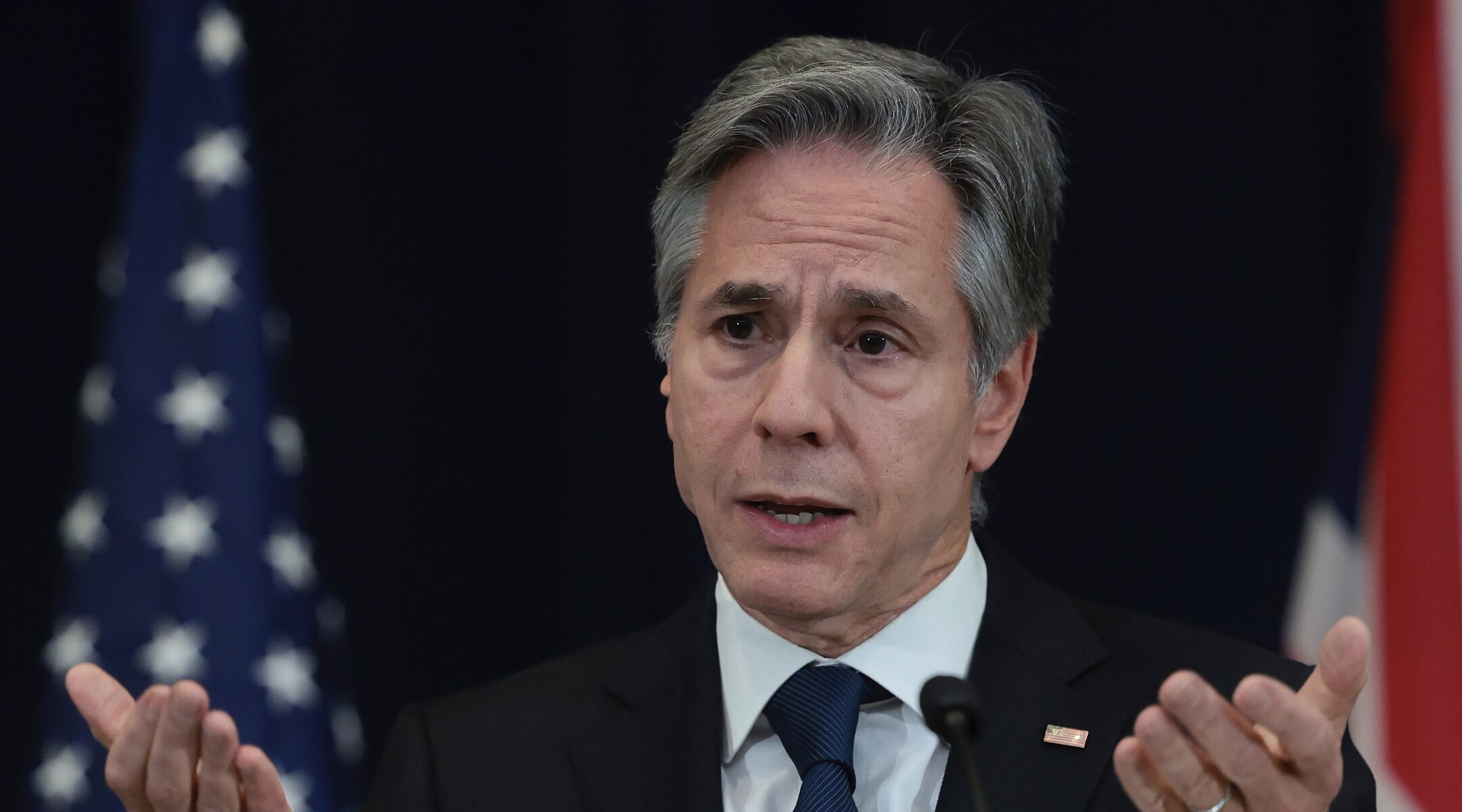WASHINGTON (JTA) — A top U.S. official denied reports that the Biden administration has set a deadline for Israel to end its war with Hamas. But U.S. officials are becoming more open and outspoken about differences between the two allies over the war’s conduct.
“We’re not in the business of being that prescriptive with a core partner and ally who has suffered such an egregious, appalling terrorist attack and who is responding in our view with what is absolutely necessary in their responsibility to reduce the threat to their own civilian population,” Jon Finer, a deputy national security adviser, said Thursday at the Aspen Security Forum in Washington, D.C.. “In terms of telling them, ‘You must stop at this moment,’ that’s not the way we conduct our business.”
Finer spoke on the same day that Secretary of State Antony Blinken expressed disappointment in Israel’s conduct of the war in the week since a pause in fighting ended, describing a “gap” between what Israeli officials pledged to him when he visited the country during the pause, and what he sees happening now. Israel is now focusing its military campaign on the city of Khan Younis in Gaza’s south, following its capture of Gaza City in the north.
“As we stand here almost a week into this campaign in the south after the end of the humanitarian pause, it is imperative – it remains imperative – that Israel put a premium on civilian protection, and there does remain a gap between exactly what I said when I was there, the intent to protect civilians, and the actual results that we’re seeing on the ground,” he said at a press conference with his British counterpart, David Cameron.
Biden also is making his frustration with Israel’s government more apparent, saying in an unusually detailed readout of his phone call Thursday with Israeli Prime Minister Benjamin Netanyahu that he told the prime minister that Israel needed to allow in “much more” humanitarian assistance.
A number of Middle East-focused media outlets, including Times of Israel and Al Monitor, have said that top U.S. officials want the war over within weeks.
Since Hamas invaded Israel on Oct. 7, launching the war, President Joe Biden has rejected calls for a ceasefire. He has robustly backed Israel’s war aims of removing Hamas from power and returning the more than 240 hostages it abducted. Hamas returned more than 100 hostages during a recent seven-day pause in the fighting during which Israel released hundreds of Palestinian security prisoners. In addition to diplomatic backing and sending warships to the region to deter broader attacks on Israel, Biden has asked Congress for $14 billion in emergency funding for the country that has yet to be approved.
But Biden has also been under increasing pressure from progressives in his party who favor a ceasefire. During the break in fighting, top officials including Blinken pressed Israel to pursue the war with more precision and less ferocity in Gaza’s south than it had in the north.
Israel resumed air strikes and ground maneuvers after the pause. According to the Hamas-run health ministry, 17,000 Palestinians have been killed since the war began, including thousands of children. That number does not differentiate between combatants and civilians and does not specify those killed by misfired rockets aimed at Israel. Hamas terrorists killed 1,200 people, most of them civilians, on Oct. 7, when it launched the war. Since then, nearly 100 Israeli soldiers have been killed in the fighting.
Biden, in his readout of the call with Netanyahu, focused on the need for more humanitarian aid to enter the Gaza Strip.
“The President underscored the importance of the continuous and sustained flow of humanitarian aid into Gaza,” the readout said. “He welcomed the recent Israeli decision to ensure that fuel levels will meet requisite needs, but stressed that much more assistance was urgently required across the board.”
Biden also was not satisfied with Israel’s handling of extremist settler attacks on Palestinians in the West Bank, which have spiked. His administration criticized Netanyahu earlier this week over the issue when it announced that it would ban entry to Israeli settlers and Palestinians who harm “peace, security, or stability in the West Bank.”
“President Biden reiterated his concern about extremist violence committed against Palestinians and the need to increase stability in the West Bank,” the readout said.
Netanyahu has seized upon the seasonal message of Hanukkah to make clear that Israel is sticking to the goal of removing Hamas from power and returning the hostages.
“We are currently deep inside the Gaza Strip,” he said, likening Israeli soldiers to the ancient Maccabees.. “This enemy will not break us up — we will break it up. This enemy will not wipe us out, we will wipe it out. This enemy will not overcome us, we will overcome it. This is being carried out day by day and night by night, and we will do it until the end.”
There also are more evident differences between the governments about what happens the day after the war ends. Netanyahu has said that under no circumstances will he transfer authority to the Palestinian Authority, which he does not trust, although the governments continue to cooperate to stem an intensification of violence in the West Bank. Blinken says the Biden administration favors a P.A. role. The Palestinian Authority governs day-to-day affairs in Palestinian population centers in the West Bank.
“We discussed in our meeting how that’s about how we build up and revitalize the Palestinian Authority, it’s about how we stand up a plan for what happens after this operation is over,” Blinken said, describing his meeting with Cameron.
The administration on Friday appeared to walk back its criticism of Israel, at least tonally. John Kirby, the National Security Council spokesman, said in a briefing with reporters that Israel appeared to be applying more care to its operations in the south, endeavoring to forewarn civilians of its actions so they can get to safer ground.
“They have in fact taken some actions to try to be more careful,” Kirby said. “They have been publishing a map of where people can go and not go, that is the definition of pulling your punches.” He added, however: “More can be done.”
JTA has documented Jewish history in real-time for over a century. Keep our journalism strong by joining us in supporting independent, award-winning reporting.






